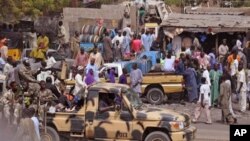A media watchdog group is calling on the Nigerian government to “ensure that international journalists are allowed to cover the February 14th elections.” The Committee to Project Journalists said a number of reporters are having difficulty getting visas to enter the country. CPJ said only a few days remain for journalists to be accredited.
"The legitimacy of Nigeria's election depends in no small part on whether the international press is allowed to cover it," said Peter Nkanga, CPJ's West Africa representative. "We call on authorities to quickly cut through the red tape and approve visas and accreditation for foreign journalists."
He said he knows of at least 20 journalists still awaiting visas.
In a statement, CPJ said, “According to the guidelines on the Nigeria Immigration Service website, journalists can apply for visas by completing an application form, paying fees, and submitting payment receipts, passport, and other documents to the Nigerian embassy in their country of residence.”
However, it said, some journalists have been waiting for months and have not received a response from the Nigerian government.
Nkanga said he has contacted numerous government officials, but was always given an excuse for not approving the visas. National security is a reason most often given. Nkanga said he understands officials’ concerns in light of Boko Haram attacks, but said the long delay could threaten the transparency of the election.
To hear Nkanga’s interview with VOA’s Joe De Capua, click on the link below.





